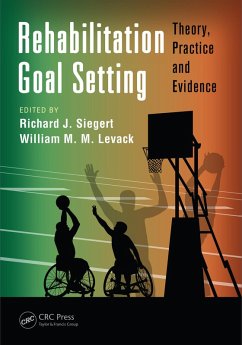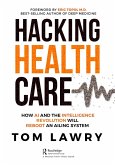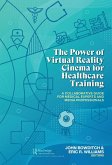Rehabilitation Goal Setting (eBook, PDF)
Theory, Practice and Evidence
Redaktion: Siegert, Richard J.; Levack, William M. M.
76,95 €
inkl. MwSt.
Sofort per Download lieferbar

38 °P sammeln
Rehabilitation Goal Setting (eBook, PDF)
Theory, Practice and Evidence
Redaktion: Siegert, Richard J.; Levack, William M. M.
- Format: PDF
- Merkliste
- Auf die Merkliste
- Bewerten Bewerten
- Teilen
- Produkt teilen
- Produkterinnerung
- Produkterinnerung

Bitte loggen Sie sich zunächst in Ihr Kundenkonto ein oder registrieren Sie sich bei
bücher.de, um das eBook-Abo tolino select nutzen zu können.
Hier können Sie sich einloggen
Hier können Sie sich einloggen
Sie sind bereits eingeloggt. Klicken Sie auf 2. tolino select Abo, um fortzufahren.

Bitte loggen Sie sich zunächst in Ihr Kundenkonto ein oder registrieren Sie sich bei bücher.de, um das eBook-Abo tolino select nutzen zu können.
Written to provide clinicians, educators, researchers, and students in rehabilitation with a comprehensive overview of the theory, practice, and evidence base of goal setting, this first-of-its-kind reference provides an authoritative, state-of-the-art knowledge of the practice. The authors cover a broad range of different approaches to goal settin
- Geräte: PC
- mit Kopierschutz
- eBook Hilfe
- Größe: 5.39MB
Andere Kunden interessierten sich auch für
![Implantable Medical Devices and Healthcare Affordability (eBook, PDF) Implantable Medical Devices and Healthcare Affordability (eBook, PDF)]() Mark C. WestImplantable Medical Devices and Healthcare Affordability (eBook, PDF)31,95 €
Mark C. WestImplantable Medical Devices and Healthcare Affordability (eBook, PDF)31,95 €![ISO 9001 (eBook, PDF) ISO 9001 (eBook, PDF)]() Itay AbuhavISO 9001 (eBook, PDF)46,95 €
Itay AbuhavISO 9001 (eBook, PDF)46,95 €![Healthcare Biotechnology (eBook, PDF) Healthcare Biotechnology (eBook, PDF)]() Dimitris DogramatzisHealthcare Biotechnology (eBook, PDF)0,00 €
Dimitris DogramatzisHealthcare Biotechnology (eBook, PDF)0,00 €![Hacking Healthcare (eBook, PDF) Hacking Healthcare (eBook, PDF)]() Tom LawryHacking Healthcare (eBook, PDF)31,95 €
Tom LawryHacking Healthcare (eBook, PDF)31,95 €![Szycher's Practical Handbook of Entrepreneurship and Innovation (eBook, PDF) Szycher's Practical Handbook of Entrepreneurship and Innovation (eBook, PDF)]() Michael SzycherSzycher's Practical Handbook of Entrepreneurship and Innovation (eBook, PDF)48,95 €
Michael SzycherSzycher's Practical Handbook of Entrepreneurship and Innovation (eBook, PDF)48,95 €![The Power of Virtual Reality Cinema for Healthcare Training (eBook, PDF) The Power of Virtual Reality Cinema for Healthcare Training (eBook, PDF)]() The Power of Virtual Reality Cinema for Healthcare Training (eBook, PDF)41,95 €
The Power of Virtual Reality Cinema for Healthcare Training (eBook, PDF)41,95 €![Management in the Age of Digital Business Complexity (eBook, PDF) Management in the Age of Digital Business Complexity (eBook, PDF)]() Management in the Age of Digital Business Complexity (eBook, PDF)40,95 €
Management in the Age of Digital Business Complexity (eBook, PDF)40,95 €-
-
-
Written to provide clinicians, educators, researchers, and students in rehabilitation with a comprehensive overview of the theory, practice, and evidence base of goal setting, this first-of-its-kind reference provides an authoritative, state-of-the-art knowledge of the practice. The authors cover a broad range of different approaches to goal settin
Dieser Download kann aus rechtlichen Gründen nur mit Rechnungsadresse in A, B, BG, CY, CZ, D, DK, EW, E, FIN, F, GR, HR, H, IRL, I, LT, L, LR, M, NL, PL, P, R, S, SLO, SK ausgeliefert werden.
Produktdetails
- Produktdetails
- Verlag: Taylor & Francis eBooks
- Seitenzahl: 412
- Erscheinungstermin: 10. Juli 2014
- Englisch
- ISBN-13: 9781439863305
- Artikelnr.: 41214247
- Verlag: Taylor & Francis eBooks
- Seitenzahl: 412
- Erscheinungstermin: 10. Juli 2014
- Englisch
- ISBN-13: 9781439863305
- Artikelnr.: 41214247
- Herstellerkennzeichnung Die Herstellerinformationen sind derzeit nicht verfügbar.
Richard J. Siegert, BSc, PGDipPsych (Clin), MSocSci, PhD, is professor of psychology and rehabilitation, Person Centred Research Centre, School of Rehabilitation and Occupation Studies, Auckland University of Technology, Auckland, New Zealand. Siegert trained in clinical psychology and completed his PhD in psychology at Victoria University of Wellington. His research interests include neuropsychology, neurological rehabilitation, psychology applied to rehabilitation, and psychometrics. Siegert is an author of 90 peer-reviewed journal articles, four invited articles, six book chapters, and a popular undergraduate rehabilitation textbook. His current interests include the application of mindfulness techniques for people with neurological conditions and outcome measurement in neuro-rehabilitation. William M.M. Levack, BPhty, MHealSc (Rehabilitation), PhD, is associate dean for research and postgraduate studies, and senior lecturer in rehabilitation, University of Otago, Wellington, New Zealand. In 2003, Levack was employed as a lecturer at the University of Otago, teaching interdisciplinary, postgraduate courses in rehabilitation by distance, and in 2008 he completed his PhD. His current projects include work on the development of a clinical measure of loss and reconstruction of self-identity after traumatic brain injury, qualitative research into the barriers and facilitator of access to evidence-based rehabilitation, and the use of kinetic video games as a form of therapeutic exercise for people with chronic respiratory disease.
Section I Goal Theory in Rehabilitation. Challenges in Theory, Practice and
Evidence. Evidence-Based Goal Setting: Cultivating the Science of
Rehabilitation. Psychology, Goals and Rehabilitation: Providing a
Theoretical Foundation. Ethics and Goal Setting. Goal Setting as Shared
Decision Making. MEANING as a Smarter Approach to Goals in Rehabilitation.
Section II Goal Setting in Clinical Practice. Goal Attainment Scaling in
Adult Neurorehabilitation. Goal Attainment Scaling in Paediatric
Rehabilitation. Applying the International Classification of Functioning,
Disability and Alexandra Rauch and Anke Scheel-Sailer. Occupation-Based,
Client-Centred Approach to Goal Planning and Measurement. Theory-Based
Approach to Goal Setting. Goal Orientation and Goal Setting in German
Medical Rehabilitation Research. Section III Specific Applications. Goal
Setting in Social Competence Treatment after Brain Injury. Self-Management
for People with Chronic Conditions. Goal Setting in Paediatric
Rehabilitation. Use of Goals as a Focus for Services for Community-Dwelling
Older People. Goals and Goal Setting for People with Aphasia, Their Family
Members and Clinicians. Goal Setting in Stroke Rehabilitation: Theory,
Practice and Future Directions. Section IV Conclusion. Concluding Comments,
Current Trends and Future Directions. Index.
Evidence. Evidence-Based Goal Setting: Cultivating the Science of
Rehabilitation. Psychology, Goals and Rehabilitation: Providing a
Theoretical Foundation. Ethics and Goal Setting. Goal Setting as Shared
Decision Making. MEANING as a Smarter Approach to Goals in Rehabilitation.
Section II Goal Setting in Clinical Practice. Goal Attainment Scaling in
Adult Neurorehabilitation. Goal Attainment Scaling in Paediatric
Rehabilitation. Applying the International Classification of Functioning,
Disability and Alexandra Rauch and Anke Scheel-Sailer. Occupation-Based,
Client-Centred Approach to Goal Planning and Measurement. Theory-Based
Approach to Goal Setting. Goal Orientation and Goal Setting in German
Medical Rehabilitation Research. Section III Specific Applications. Goal
Setting in Social Competence Treatment after Brain Injury. Self-Management
for People with Chronic Conditions. Goal Setting in Paediatric
Rehabilitation. Use of Goals as a Focus for Services for Community-Dwelling
Older People. Goals and Goal Setting for People with Aphasia, Their Family
Members and Clinicians. Goal Setting in Stroke Rehabilitation: Theory,
Practice and Future Directions. Section IV Conclusion. Concluding Comments,
Current Trends and Future Directions. Index.
Section I Goal Theory in Rehabilitation. Challenges in Theory, Practice and
Evidence. Evidence-Based Goal Setting: Cultivating the Science of
Rehabilitation. Psychology, Goals and Rehabilitation: Providing a
Theoretical Foundation. Ethics and Goal Setting. Goal Setting as Shared
Decision Making. MEANING as a Smarter Approach to Goals in Rehabilitation.
Section II Goal Setting in Clinical Practice. Goal Attainment Scaling in
Adult Neurorehabilitation. Goal Attainment Scaling in Paediatric
Rehabilitation. Applying the International Classification of Functioning,
Disability and Alexandra Rauch and Anke Scheel-Sailer. Occupation-Based,
Client-Centred Approach to Goal Planning and Measurement. Theory-Based
Approach to Goal Setting. Goal Orientation and Goal Setting in German
Medical Rehabilitation Research. Section III Specific Applications. Goal
Setting in Social Competence Treatment after Brain Injury. Self-Management
for People with Chronic Conditions. Goal Setting in Paediatric
Rehabilitation. Use of Goals as a Focus for Services for Community-Dwelling
Older People. Goals and Goal Setting for People with Aphasia, Their Family
Members and Clinicians. Goal Setting in Stroke Rehabilitation: Theory,
Practice and Future Directions. Section IV Conclusion. Concluding Comments,
Current Trends and Future Directions. Index.
Evidence. Evidence-Based Goal Setting: Cultivating the Science of
Rehabilitation. Psychology, Goals and Rehabilitation: Providing a
Theoretical Foundation. Ethics and Goal Setting. Goal Setting as Shared
Decision Making. MEANING as a Smarter Approach to Goals in Rehabilitation.
Section II Goal Setting in Clinical Practice. Goal Attainment Scaling in
Adult Neurorehabilitation. Goal Attainment Scaling in Paediatric
Rehabilitation. Applying the International Classification of Functioning,
Disability and Alexandra Rauch and Anke Scheel-Sailer. Occupation-Based,
Client-Centred Approach to Goal Planning and Measurement. Theory-Based
Approach to Goal Setting. Goal Orientation and Goal Setting in German
Medical Rehabilitation Research. Section III Specific Applications. Goal
Setting in Social Competence Treatment after Brain Injury. Self-Management
for People with Chronic Conditions. Goal Setting in Paediatric
Rehabilitation. Use of Goals as a Focus for Services for Community-Dwelling
Older People. Goals and Goal Setting for People with Aphasia, Their Family
Members and Clinicians. Goal Setting in Stroke Rehabilitation: Theory,
Practice and Future Directions. Section IV Conclusion. Concluding Comments,
Current Trends and Future Directions. Index.







